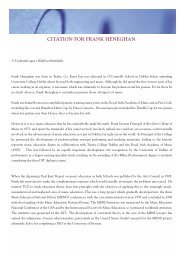TWICE THE SIZE - DIT Update - Dublin Institute of Technology
TWICE THE SIZE - DIT Update - Dublin Institute of Technology
TWICE THE SIZE - DIT Update - Dublin Institute of Technology
Create successful ePaper yourself
Turn your PDF publications into a flip-book with our unique Google optimized e-Paper software.
20. Small business in Ireland is big business. Over 97% <strong>of</strong> businesses in Ireland are<br />
Wild Cards<br />
‘small’ (employing fewer than fifty people) and they employ 777,000 people. In<br />
many ways, the health <strong>of</strong> the small business sector is both an indicator <strong>of</strong> the<br />
condition <strong>of</strong> the whole economy and a determination <strong>of</strong> that condition. A number <strong>of</strong><br />
issues face the small business sector including: burdensome and costly<br />
administrative regulations; rising local authority charges; poor access to information<br />
and advice; inadequate infrastructure; difficulty in accessing finance; weak<br />
management capability; lack <strong>of</strong> innovation; under-exploitation <strong>of</strong> ICT; and the lack<br />
<strong>of</strong> a systematic approach to entrepreneurship. The small business sector in Ireland<br />
is the potential engine for growth for the future <strong>of</strong> the Irish economy.<br />
Some potential ‘wild cards’ are:<br />
Emerging markets fail to reform their financial institutions.<br />
Worldwide stock market crash.<br />
Collapse <strong>of</strong> a giant global corporation.<br />
China and India fail to sustain high growth.<br />
Internet disintegration.<br />
GOVERNANCE CHANGE<br />
In that virtually all the other major drivers <strong>of</strong> change are influenced by the decisions <strong>of</strong> people,<br />
for good or bad, governance, in all its dimensions, is perhaps the overriding driver <strong>of</strong> all. States<br />
might continue to be the dominant players on the world stage in 2030, but governments will<br />
have less and less control over flows <strong>of</strong> information, technology, diseases, migrants, arms and<br />
financial transactions, whether licit or illicit, across their borders. Non-state actors, ranging<br />
from commercial corporations to voluntary organisations, will play increasingly larger roles in<br />
both national and international affairs. The nature and quality <strong>of</strong> governance, globally and<br />
locally, will substantially determine how well communities at all scales cope with future global<br />
change.<br />
Global Context<br />
The ten most significant global governance trend drivers and issues have been identified as<br />
follows.<br />
1. Governmentally, the degree <strong>of</strong> direct influence that national governments exercise<br />
over people’s actions, social problems, economic performance and corporate power<br />
will lessen. Power will pass upwards to supra-national bodies and downwards to<br />
subsidiary authorities at regional, federal, provincial, state or city level.<br />
80








